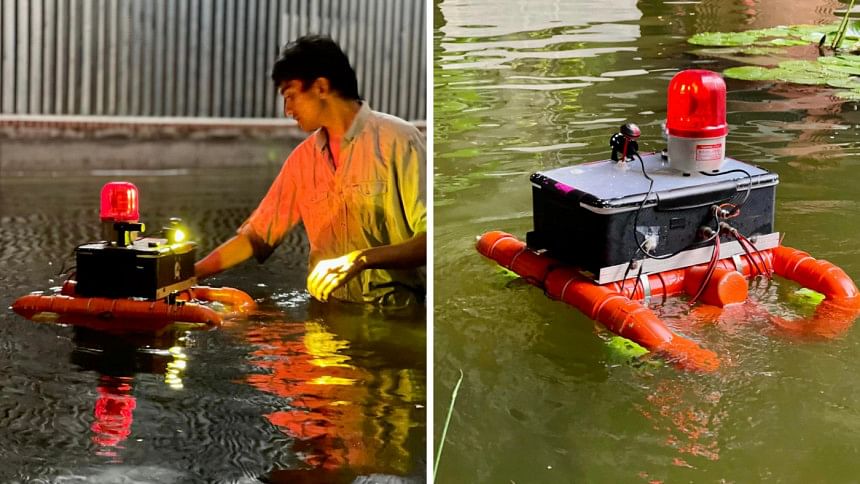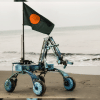BRACU students develop ‘Nabik’ robot for flood relief

Students from the Robotics Club of BRAC University, in collaboration with the startup Nabik Automations, have developed a remote-controlled robot to assist in flood relief in affected regions. Named 'Nabik', this two-foot-long boat is designed to deliver life jackets and food packages to places where larger vessels cannot reach. It also provides real-time footage to ensure communication between rescue teams and those in need.
Nabik Automations was originally formed in 2022 by Fardeen Khan and Mashruzzaman, current students of BRAC University, under the guidance of Adil Hossain, an alumnus. What began as their university project evolved into an early-stage startup, with operations in both Bangladesh and Canada. The team currently comprises Adil Hossain, Fardeen Khan, Mashruzzaman, Md Saqlain Newaz Chowdhury, Fariyan Shah Fahi, Bhuban Mazumder, Miftahul Jannat Babui, and Abu Auhon Rahman.
According to the members, when the recent floods struck, the team quickly mobilised to adjust their existing technology for real-world application. On August 25, just days after the floods began, the team initiated a flood relief operation. Within three days, they had sourced and bootstrapped the necessary funds to specifically tailor their robot for the challenges posed by the floodwater. The Robotics Club of BRAC University provided critical support, offering equipment and lab facilities to help bring the project to fruition.
'Nabik' is equipped with a surface water rover that is particularly effective in flood relief operations, says the team behind the robot. It boasts stability even when carrying significant loads and can operate in low water levels, making it ideal for navigating the tight spaces often found in flood-affected areas, which often become inaccessible to larger boats, making it difficult for relief teams to deliver essential supplies.
"The goal of this robot was to inspect areas and provide necessary relief to places where human access is difficult," said Abu Auhon Rahman from the Department of Outreach at Nabik Automations. "It can also carry a payload of up to 60 kilograms and has a battery life of approximately three hours."
Controlled remotely, 'Nabik' has a range of up to two kilometres, allowing operators to guide it from a safe distance. It is equipped with a First Person View (FPV) camera, which provides live footage from the affected areas. It is also fitted with a microphone, enabling two-way communication between the robot and the control team.
According to Auhon, the team conducted their first successful mission on August 28, delivering relief goods and medical supplies to the Baligaon union in Feni, a region severely impacted by the floods. The supplies included sanitary napkins, water purifying tablets, and saline, which were transported to areas where conventional boats could not reach. "Our initial plan was to supply relief goods, and we were successful, although we faced some challenges with heating issues that prevented us from retrieving 'Nabik' after the mission," Auhon mentioned.
Despite these challenges, the mission provided valuable data and insights that will help the team refine and improve the robot's design for future operations, Auhon said. "Our major concern was that our team conducted tests in relatively calm conditions, and we anticipated challenges in the more extreme environments of the flood-affected regions. This was our first time facing a real-life situation so we learned a lot. We are now committed to coming back with a better plan and improved technology," he added.
Nabik Automations is still in its early stages, and while the startup is gaining recognition, the team stresses the importance of support from the public and private sectors. "Our affiliation with BRAC was specifically for this flood relief effort. We encourage anyone interested in supporting in-house technological development in Bangladesh to come forward and help us," Auhon stated. The team believes that if 'Nabik' is successful, it could become a standard tool in disaster response, with the potential for further development and wider deployment in the future.

 For all latest news, follow The Daily Star's Google News channel.
For all latest news, follow The Daily Star's Google News channel. 








Comments